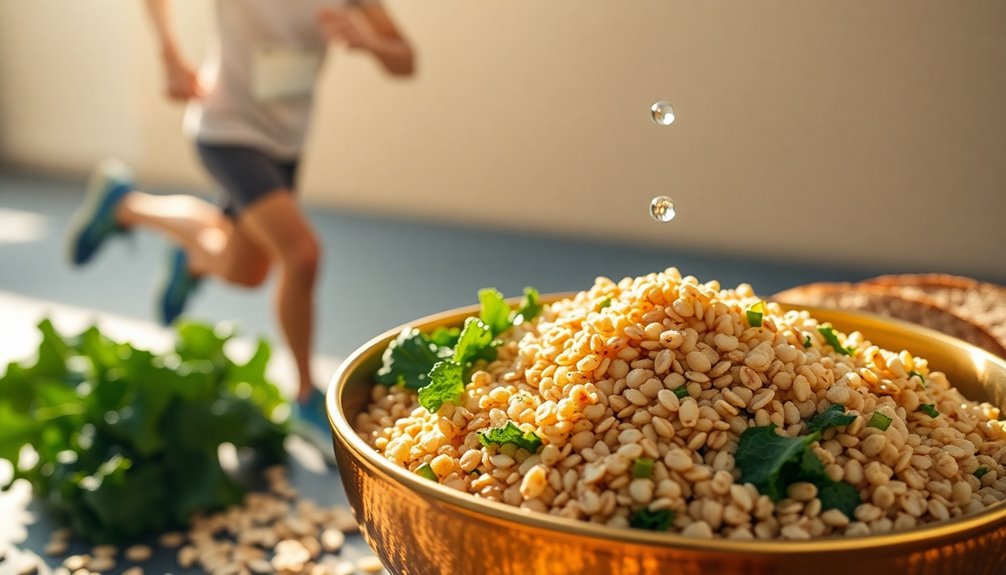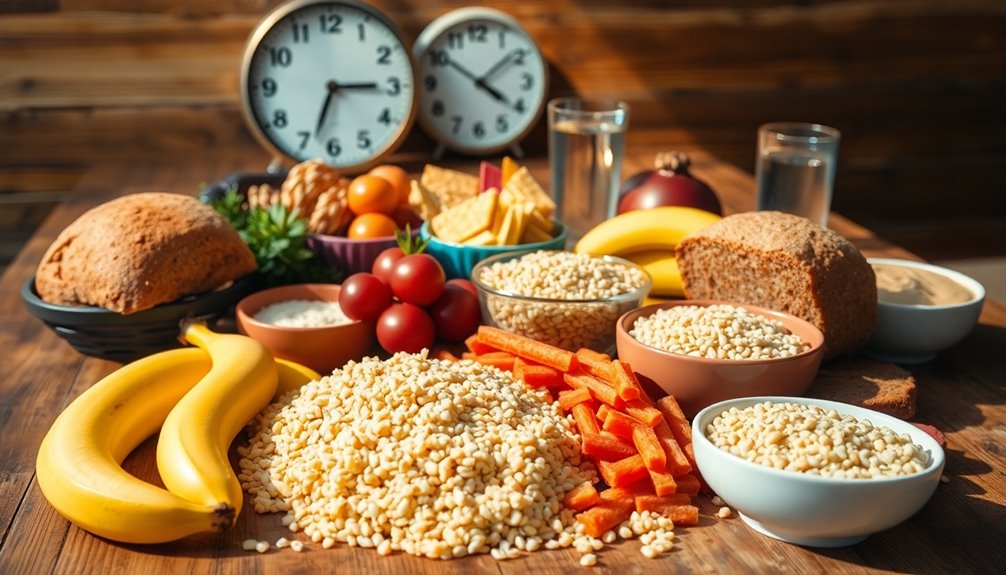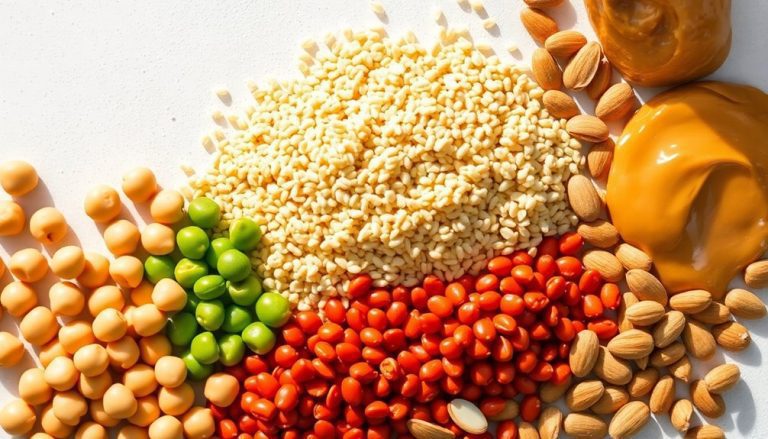Carbohydrates are your body's main energy source, significantly impacting your energy levels. When you consume them, your body breaks them down into glucose, which fuels your brain and muscles. Simple carbs, like fruits, give quick energy, while complex carbs, such as whole grains, offer sustained power. Regular intake helps replenish glycogen stores, which can prevent fatigue during your daily activities and workouts. Timing your carbs—like having oatmeal for breakfast or sweet potatoes for dinner—can enhance your overall energy. Explore how different types of carbs can further support your energy needs and boost your performance.
Key Takeaways
- Carbohydrates are the body's primary energy source, converting into glucose for immediate energy or stored as glycogen for later use.
- Consuming a balanced mix of simple and complex carbs sustains energy levels and enhances brain and muscle function.
- Timing carb intake throughout the day, such as during meals and snacks, helps regulate energy and prevent fatigue.
- Proper carbohydrate consumption before and after exercise boosts performance and aids in glycogen replenishment during recovery.
- Quality carbohydrate sources, like whole grains and fruits, provide essential nutrients while maintaining steady energy levels throughout the day.
Understanding Carbohydrates

When you break down carbohydrates, you're tapping into one of the body's primary energy sources. Carbohydrates are organic compounds made up of carbon, hydrogen, and oxygen, and they come in different forms. They serve as fuel for your brain, muscles, and other vital organs. Seed starting kits can also provide the necessary nutrients for plants that produce carbohydrate-rich foods.
Understanding how carbohydrates function is crucial for maintaining your energy levels throughout the day. Your body processes carbohydrates into glucose, which it uses immediately for energy or stores for later use. This process is essential for activities ranging from simple daily tasks to intense workouts.
Without adequate carbohydrates, you might feel fatigued, sluggish, or unable to concentrate. You'll often hear about "simple" and "complex" carbohydrates, but both types play a role in your energy management. Simple carbs provide quick bursts of energy, while complex carbs offer sustained energy over longer periods.
Knowing the right balance can help you optimize your energy levels and improve your overall performance. Incorporating healthy carbohydrates into your diet ensures that your body has the energy it needs. Additionally, using quality plant food can support the growth of fruits and vegetables that are rich in carbohydrates.
Pay attention to how different sources affect your energy, and you'll be better equipped to fuel your daily activities effectively.
Types of Carbohydrates
Carbohydrates can be categorized into three main types: sugars, starches, and fiber, each playing a unique role in your diet. Understanding these types can help you make better food choices that support your energy levels.
- Sugars: These are simple carbohydrates that provide quick energy. Found in fruits, honey, and table sugar, they're easily absorbed by your body. Additionally, incorporating natural sweeteners can enhance the flavor of your meals while providing energy.
- Starches: These complex carbohydrates consist of long chains of sugar molecules, which break down into glucose more slowly than sugars. You'll find starches in foods like potatoes, rice, and whole grains, providing sustained energy.
- Fiber: This type of carbohydrate isn't digestible, but it's essential for digestive health. It helps regulate blood sugar levels and keeps you feeling full longer. Foods rich in fiber include vegetables, legumes, and whole grains.
- Refined vs. Whole Carbohydrates: Opt for whole carbohydrates, like whole grains and fruits, over refined options (like white bread and pastries) to ensure you're getting more nutrients and longer-lasting energy. Additionally, incorporating organic mulching materials can enhance soil health, which supports the growth of nutrient-rich crops.
The Role of Glycogen

Storing energy for later use, glycogen plays a crucial role in maintaining your energy levels throughout the day. This polysaccharide serves as your body's primary form of stored carbohydrate, primarily found in your liver and muscles.
When you consume carbohydrates, your body breaks them down into glucose, which can then be converted into glycogen and stored for future energy needs.
During physical activity or periods of fasting, your body taps into these glycogen reserves. It's especially vital during high-intensity workouts, where your muscles require quick bursts of energy. The more glycogen you have stored, the longer you can sustain your energy levels during exercise or other demanding tasks.
However, if your glycogen stores run low due to inadequate carbohydrate intake or prolonged exercise, you may experience fatigue, decreased performance, and diminished focus.
This is why it's essential to consume enough carbohydrates to replenish these stores, ensuring you have the energy you need for daily activities and workouts. Additionally, proper nutrition, including fertilizer tablets for your plants, can help ensure you have the materials necessary for energy production, similar to how your body requires carbohydrates.
Carbs and Immediate Energy
Fueling your body with carbohydrates provides immediate energy, crucial for both daily activities and intense workouts. When you consume carbs, your body breaks them down into glucose, which serves as a quick source of energy. This is especially important when you need to perform at your best or when you're engaged in physically demanding tasks.
Here are four key reasons why carbs are essential for immediate energy:
- Rapid Absorption: Simple carbohydrates, like sugars, are absorbed quickly, giving you a fast energy boost.
- Glycogen Stores: Your muscles and liver store glucose as glycogen, ready to be used during exercise or activity.
- Brain Function: Glucose is the brain's primary fuel source, helping you stay alert and focused throughout the day.
- Enhanced Performance: Consuming carbs before and during workouts can improve endurance and overall performance.
Impact of Fiber on Energy

Fiber plays a vital role in regulating your energy levels throughout the day. It's not just about keeping you full; fiber influences how your body processes carbohydrates. When you consume fiber-rich foods, they slow down digestion and glucose absorption, leading to a steadier release of energy. This means you won't experience those pesky energy spikes and crashes that often come from simple carbs.
Incorporating both soluble and insoluble fiber into your diet can enhance your energy stability. Soluble fiber, found in oats, beans, and fruits, forms a gel-like substance in your gut, which helps regulate blood sugar levels. Insoluble fiber, found in whole grains and vegetables, adds bulk to your meals, supporting digestive health and keeping you satisfied longer.
Moreover, fiber-rich foods often come packed with essential vitamins and minerals. When you choose these over processed options, you're not just fueling your body, but also providing it with the nutrients it needs to function optimally.
Low vs. High Glycemic Index
Understanding how carbohydrates affect your energy levels also involves recognizing the difference between low and high glycemic index (GI) foods. The glycemic index measures how quickly a carbohydrate-containing food raises your blood sugar. Low GI foods release energy slowly, while high GI foods can cause rapid spikes.
Choosing the right GI foods can significantly influence your energy throughout the day. Here are some key points to consider:
- Sustained Energy: Low GI foods like whole grains, legumes, and most fruits provide a steady energy release, keeping you fuller for longer.
- Blood Sugar Control: Low GI foods help maintain steady blood sugar levels, reducing the risk of energy crashes.
- Quick Energy Boost: High GI foods, like sugary snacks and white bread, can give you a quick energy spike but may lead to a crash afterward.
- Overall Health: Opting for low GI foods can improve your overall health by reducing the risk of chronic diseases like diabetes and heart disease.
Timing Carbohydrate Intake

Timing your carbohydrate intake can make a significant difference in how you feel throughout the day. When you strategically consume carbs, you can harness their energy-boosting benefits to enhance your overall well-being and productivity. For instance, eating complex carbs in the morning fuels your brain and body, while a balanced intake throughout the day helps maintain steady energy levels.
Here's a simple guide to help you time your carbohydrate consumption effectively:
| Time of Day | Recommended Carbohydrates | Purpose |
|---|---|---|
| Breakfast | Oatmeal, whole grain toast | Kickstart energy for the day |
| Mid-Morning | Fruit, yogurt | Sustain energy and curb cravings |
| Lunch | Quinoa, brown rice | Provide fuel for afternoon tasks |
| Afternoon Snack | Nuts, hummus with veggies | Avoid energy slumps |
| Dinner | Sweet potatoes, legumes | Promote restful sleep |
Carbs and Exercise Performance
Energy is crucial for optimal exercise performance, and carbohydrates play a key role in fueling your workouts. When you engage in physical activity, your body demands energy, primarily derived from glycogen, which is stored in your muscles and liver. Consuming carbs before and after exercise can significantly enhance your performance and recovery.
Here are four reasons why carbs matter for your workouts:
- Immediate Energy Source: Carbohydrates break down quickly into glucose, providing the instant energy needed during high-intensity activities.
- Endurance Boost: Proper carb intake helps sustain energy levels during prolonged activities, preventing fatigue and allowing you to push through those last few reps or miles.
- Glycogen Replenishment: After exercising, consuming carbs helps replenish glycogen stores, crucial for recovery and preparing for your next workout.
- Improved Focus: Sufficient carb intake supports brain function, enhancing your focus and motivation during workouts.
Incorporating the right amount of carbohydrates into your diet can lead to better workout performance, making it an essential part of your fitness regimen.
Common Myths About Carbs

Many people fall for common myths about carbohydrates, which can lead to confusion and misguided dietary choices. One prevalent myth is that all carbs are bad for you. In reality, carbohydrates are essential for providing energy, especially during physical activities. It's not the carbs themselves you should worry about, but the type of carbs you consume.
Another myth is that cutting carbs entirely will help you lose weight. While reducing excessive intake of refined carbs can be beneficial, completely eliminating them can lead to energy dips and cravings. Your body needs carbohydrates to function well, particularly for brain health.
You might also hear that eating carbs at night will make you gain weight. That's not true; what matters more is your overall calorie intake throughout the day.
Lastly, some believe that low-carb diets are the only way to improve athletic performance. However, many athletes thrive on a balanced diet that includes healthy carbs.
Best Carbohydrate Sources for Energy
Choosing the right carbohydrate sources can significantly boost your energy levels throughout the day. When you fuel your body with quality carbs, you'll notice improved focus and stamina.
Here are four of the best carbohydrate sources to consider:
- Whole Grains: Foods like brown rice, quinoa, and whole grain bread provide sustained energy due to their high fiber content. They help regulate blood sugar levels, preventing energy crashes.
- Fruits: Bananas, apples, and berries are packed with natural sugars, vitamins, and minerals. They're quick sources of energy and great for snacks or pre-workout fuel.
- Legumes: Lentils, chickpeas, and black beans are excellent sources of complex carbohydrates and protein. They digest slowly, giving you lasting energy and keeping you feeling full.
- Vegetables: Starchy vegetables like sweet potatoes and corn offer carbohydrates along with essential nutrients. They're versatile and can be included in various meals to enhance your energy intake.
Incorporating these carbohydrate sources into your meals can keep your energy levels steady, helping you tackle daily tasks with vigor.
Frequently Asked Questions
Can Carbohydrates Affect Mood and Mental Energy Levels?
You'll find that what you eat influences how you feel. Carbohydrates can boost your mood and enhance your mental energy. When you choose the right ones, you'll notice a difference in your overall well-being.
How Do Carbohydrates Influence Sleep Quality and Duration?
Carbohydrates can significantly influence your sleep quality and duration. When you consume them, they promote the production of serotonin, which helps regulate sleep. However, eating too many before bed might disrupt your rest. Balance is key!
Are There Any Negative Side Effects of Carbohydrate Consumption?
Sure thing! Overdoing it on carbs can lead to weight gain, spikes in blood sugar, and digestive issues. You might also feel sluggish or experience cravings, so balance is key in your diet.
Can I Consume Carbs While Following a Ketogenic Diet?
You can consume carbs on a ketogenic diet, but it's crucial to keep them very low. Focus on non-starchy vegetables and track your intake to maintain ketosis and achieve your health goals effectively.
How Do Different Cooking Methods Change Carbohydrate Content?
When you roast vegetables, think of caramelized edges glistening under the heat. Different cooking methods can break down carbohydrates, altering their content; boiling might leach nutrients, while baking enhances flavors without significant carb loss.
Conclusion
In the grand tapestry of nutrition, carbohydrates are your trusty allies in maintaining energy levels. By understanding their role and timing your intake, you can keep fatigue at bay and fuel your adventures. Embrace the right sources and debunk those pesky myths around carbs, and you'll find they can be a delightful part of your diet. So, let carbs work their magic, and enjoy the vibrant energy they bring to your day!




